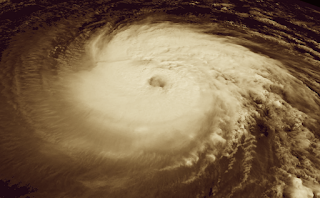 |
| NOAA satellite image, with sepia tone added. |
Florida has been in a frenzy in recent days, as Tropical Storm Erika churned in the Atlantic. The system has dissipated but hasn't fully expired. Rain, wind, and some flooding are in store.
As unnerving as the steady stream of media coverage can be, I'm glad I can track every millisecond of a tropical system's activity. Pioneers couldn't. People often relied on weather lore, close reading of atmospheric conditions, and the lived experience of longtime residents.
Forecasting was still young when a hurricane hit Central Florida in 1880. That particular storm interests me for two reasons: pioneer Girard M. Parce, a boy at the time, wrote about it in his late-in-life recollections; and the steamship Vera Cruz sank in it, just off the Central Florida coast.
The book Florida's Hurricane History notes that early 20th century assessments considered the 1880 storm a "Great Hurricane" with winds over 125 mph. Fairly recent re-analysis data from NOAA puts it at a Category 2 with maximum winds of 90 mph. Having lived through hurricanes, I can say that anything over 70 mph is very scary indeed.
Girard's recollections corroborate the book's comment that countless trees were downed in the storm, which made landfall between Palm Beach and Cocoa Beach, and then traveled northwest across the state. Girard was in DeLand, where he wrote that:
"... we were kept in the house for two days, not daring to go out except to feed the stock, because so many of the big pine trees were being blown down."
I wish he'd written more about the actual hurricane, which he referred to as "The Big Storm." He focused more on what happened afterward. It's fascinating. Because he says the storm wrecked three ships off the local coast, not just one.
"A short time after the storm I drove [by horse-drawn cart] a party of several men to Port Orange. While there we went up to Daytona and ferried over to the peninsula where lay on the beach the wreckage of a large ship, the Vera Cruz, and two lumber schooners. I believe one could have walked a half mile in either direction without stepping on the ground."
He notes that a salvage company "with a large gang of men" was busy on the scene, and that his older brother William thought the Vera Cruz had carried a cargo of mahogany. You can read a richly detailed account of the steamship - and some of its passengers - on shipwrecks.com.
Girard recorded his memories in the 1920s at the request of his cousin - the daughter of the city of DeLand's founder. She (Helen DeLand) was collecting material for her history of the city, published in 1928 as The Story of DeLand and Lake Helen, Florida.

No comments:
Post a Comment